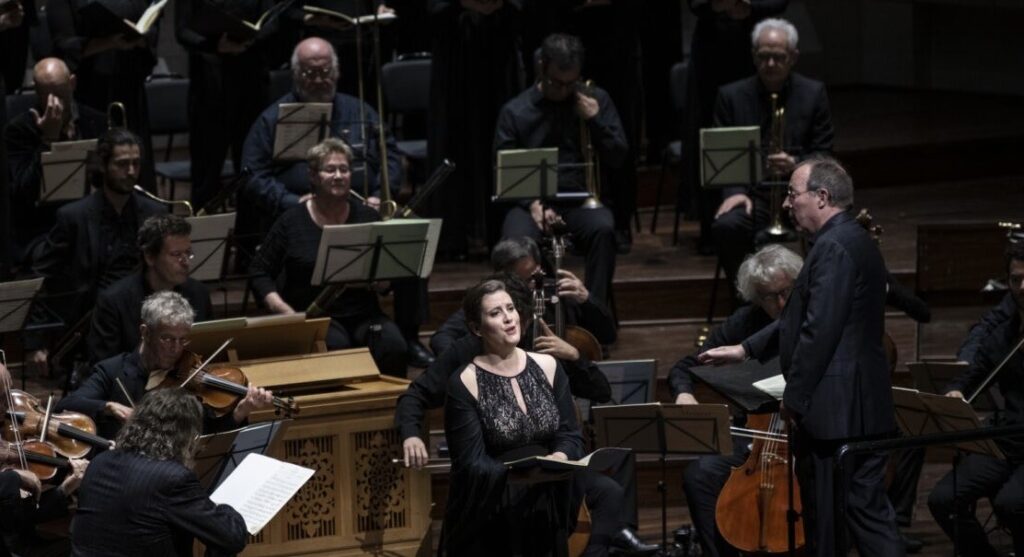
The Orchestra of the Eighteenth Century said farewell to its director Sieuwert Verster. A report.
Sometimes you get a concert programme which just works from beginning to end. That was the case with the concert by the Orchestra of the Eighteenth Century together with Cappella Amsterdam conducted by Daniel Reuss.
The Orchestra of the Eighteenth Century said goodbye to its incredibly dedicated director Sieuwert Verster in a series of memorable concerts. Never before have masses for the dead and farewell pieces sounded so refined and weighty.
On Thursday 20th October the orchestra and choir played their last Dutch concert in the series in Utrecht. The Main Hall in TivoliVredenburg has been one of the most important venues for the Orchestra for many years. Before the concert the classical programmer of TivoliVredenburg, Peter Tra, also personally said goodbye to Sieuwert Verster.
Cappella Amsterdam opened the concert with one of the loveliest tearjerkers from Flemish polyphon. Josquin des Prez wrote his Nymphes des Bois (1497) as a last tribute to his deceased and cherished colleague Johannes Ockeghem. Cappella created a robust, broadly expressive performance full of rich colours. Most impressive is the way in which at the end the lovely melody flourishes, music and words come together in the phrase ‘Rust in vrede. Amen’.
The Dutch composer Martijn Padding wrote a new work for the orchestra as a farewell present for Sieuwert Verster . In his Farewell (2022) Padding as ever drives the listener into a whirlwind ride. Padding starts with a simple motief, consisting of one long and one short note. This is based on the sweeping sound of the name ‘Sieuwert’. Typical Padding-humour but his new work starts serenely. Farewell is a ceremonial work, in which the sounds process in a stately fashion. Padding makes subtle use of the thin orchestral sound in which biting winds and thin strings create a magical sensory effect. The percussionist is prominent and hits strange accents. After a while Padding’s composition takes an unexpectedly luxurious course, in which influences from Claude Vivier and mentor Louis Andriessen appear.
Padding was Louis Andriessen’s assistant in the completion of his last magnum opus, May from 2020. Remarkable that Andriessen – suffering from Alzheimer’s- could still make such strong piece. May is written as a commission from the Orchestra and is a gracious bow to the inspiration for the orchestra, conductor Frans Brüggen. Andriessen is inspired by the text of Herman Gorter’s famous poem May (1889). A poem about the beauty of Dutch nature, translated into mythical proportions. May is characteristic Andriessen in which his mild, loving side can be heard. The Andriessen from opera highlights such as Hadewijch (from De Materie) and Writing To Vermeer. It is wondrously lovely music, in which the choir is epically raised on high by the transparent orchestra sound. Andriessen gets deep into the emotional core of Gorter’s lines. The choir is continuously stimulated by short shuddering strings and pregnant wind parts à la Andriessen. The short intermezzo on the piano and glockenspiel is delightful.
Mozart to finish. The Viennese Master wrote possibly the loveliest requiem of all. Mozart’s Requiem (1791) gets a spectacular performance. Cappella Amsterdam and the Orchestra of the Eighteenth Century exceed themselves. A highly energetic and dynamic performance. The Kyrie is very moving and the Dies Irae thunders past extremely fast. The Recordare, Jesu Pie and much loved Lacrimosa are the highlights. Of the four soloists it is mainly soprano Carolyn Sampson and alto Marianne Beate Kielland who touch us the most. Sieuwert Verster could not have wished for a lovelier farewell.
Written by programme maker Mark van de Voort.
Go here to Concertpodium and listen to the Mozart Requiem.
Listen here to In Memoriam Louis Andriessen.
Listen here to works by Josquin des Prez.








